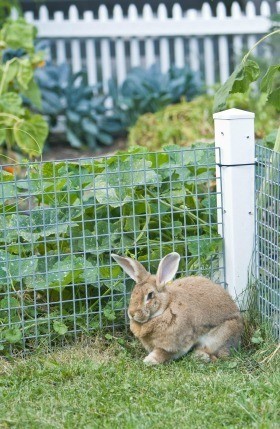 How many times have you carefully planted a vegetable garden, only to have the fruits of your labor eaten by wildlife? The only real solution is to erect a fence that keeps the animals out. There are many types of fences to choose from. The ultimate decision comes down to budget, time, and what works best for your particular situation. Whatever you select, try to put up the fencing before animals discover your crops; once they find out how delicious your things taste, they are likely to return for another meal.
How many times have you carefully planted a vegetable garden, only to have the fruits of your labor eaten by wildlife? The only real solution is to erect a fence that keeps the animals out. There are many types of fences to choose from. The ultimate decision comes down to budget, time, and what works best for your particular situation. Whatever you select, try to put up the fencing before animals discover your crops; once they find out how delicious your things taste, they are likely to return for another meal.
Another trick is to avoid stringing the fencing too tightly. Most animals are less likely to scale a floppy, unstable fence than a tight one. Sturdy 2 foot-high mesh may also work for animals like skunks and rabbits, but it's not tall enough to prevent animals from climbing over or burrowing under.
Chicken wire isn't suitable for keeping deer out of your garden, unless you nearly triple its height and erect a fence that is 8 to 12 feet tall'an expensive prospect that is both difficult to erect as well as to maintain.
Double Fences: One relatively simple (and relatively inexpensive) method to try is to erect two 3 to 4 foot-high fences spaced three feet apart from one another. Deer have an aversion to jumping over a low fence when another fence is visible just on the other side. Any type of three foot tall fencing will work for this, but if you're using single strands of wire, each fence should be made up of at least 3 strings. The fence needs to be easily visible in order for this to work, so you may want to tie white rags along the length of the fence line to make it more defined.
Height: The most effective way to deter deer from your vegetable garden is to build a fence that is too high for them to jump over'for deer, a minimum height of 8 feet. Standard woven wire farm fencing comes 4 feet tall, so it can be stacked to create an 8-foot-high fence. This method isn't inexpensive and it takes a lot of time, but if you plan to invest a lot of time and effort into vegetable gardening, it will be worth it.
Plants and debris that collect against the wire can drain the fence's power, so you will need to keep the area around it clean. You should also check the fence's charge periodically with a voltage tester to make sure it's working correctly. If you have young children or free-roaming pets, you may want to consider another type of fencing altogether.
ThriftyFun is one of the longest running frugal living communities on the Internet. These are archives of older discussions.
If you have gardens in different places and need fencing that is not necessarily permanent, try buying cheap fence and use used canopy poles to erect sturdy but temporary fencing.